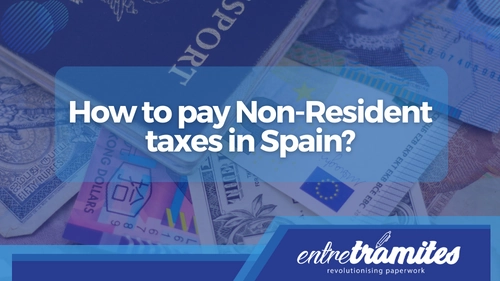One of the fundamental aspects of taxation in Spain is the distinction between residents and non-residents. This differentiation has significant implications for who should pay taxes and how much should be paid. In this article, we will explore who is considered non-resident in Spain, when they must pay non-resident taxes in Spain, and how this tax system works.
Who are considered non-residents in Spain?
In tax terms, a non-resident is considered a natural person who has a residence in Spain but resides in the country for a maximum of 183 days per year. In order to avoid having to pay taxes or non-resident taxes in Spain, three key conditions must be met:
- Do not have a residence in Spain. This means that you must not have a main residence in the country.
- Do not live in Spain more than 183 days a year. Any day is counted, not necessarily consecutive.
- Do not have the main core of economic or family interests in Spain. This implies that your main economic activities and most significant family ties must be outside Spain.
Who are considered residents in Spain?
On the other hand, any person who has a residence in the country and lives a minimum of 183 days during a year will be considered a resident in Spain, without the need for these days to be consecutive.
Tax residence vs. fiscal domicile
It is important to clarify the difference between tax residence and fiscal domicile. The fiscal domicile refers to the place where a natural or legal person must be liable for taxes, and does not always coincide with their registered office. Tax residence is used to determine the country in which a person must pay taxes and income.
Do non-residents have to pay taxes in Spain?
Any person who resides in Spain and lives there for at least 183 days a year must contribute taxes in this country. Additionally, there may be situations where they must pay taxes for specific periods depending on how long they have lived in Spain or another country.
Taxation of non-resident inheritors
When a non-resident person receives an inheritance of property in Spain, they must pay taxes as a non-resident person, just like any other individual in their situation.
Tax differences between residents and non-residents
The differences in non-resident taxes in Spain compared to residents are notable. Both must have a home in Spain, but the key difference lies in the number of days they reside in the country during a year. This has significant tax implications, residents face broader tax obligations in Spain, taxing global profits, whereas non-resident taxes in Spain apply solely to profits earned within the country during non-residency. The rest of the benefits must be taxed in the country of residence.
In addition, there are differences in tax rates, deductions, and tax percentages between residents and non-residents.
Non-Resident Income Taxes (IRNR)
The IRNR (Impuestos de No Residentes sobre la Renta) is the tax that people considered non-residents in Spain must pay. Unlike the Personal Income Tax (IRPF), which only applies to residents, the IRNR has different rates and percentages and only applies when non-residents obtain benefits in Spain, whether from economic activities, pensions, or housing income. This tax is not required when the profits come from the taxpayer’s country of residence.
IRNR rate for non-residents
The Non-Resident Income Tax rate is not fixed and depends on the benefits obtained in Spain, as well as the country of residence of the taxpayer. In Spain, rates range between 19% and 24% on all profits obtained in Spanish territory. However, some countries may impose additional fees for profits earned in different locations.
What is a tax haven?
Tax havens are territories with low or no taxation where non-residents establish their tax domicile to benefit from these measures and pay taxes in these places instead of their country of residence. Although tax havens are not illegal, tax avoidance is considered a crime in many places, and most countries are implementing measures to regulate this practice.
The State Tax Administration Agency (AEAT) establishes a list of countries and territories of non-cooperative jurisdiction to combat tax evasion.
Double taxation agreement to avoid paying non-resident taxes in Spain
Spain has signed bilateral agreements with most countries to define the connection points when paying taxes for concepts such as inheritances, donations, purchase and sale of social shares, purchase and sale of homes, income from rentals of homes in Spain, and capital gains, among others. others. These agreements determine which country has the authority to settle taxes. In some cases, it may be necessary to pay taxes in both countries, but the aim is to avoid double taxation by allowing the lesser of the amounts paid in one country or the other to be deducted.
In summary, understanding the difference between residents and non-residents is essential to complying with non-resident taxes in Spain. The Non-Resident Income Tax (IRNR) is a crucial component of this system and affects those who obtain benefits in the country without having tax residency. Rates and regulations may vary depending on the individual situation, so it is advisable to seek appropriate tax advice to ensure compliance with tax obligations in Spain.
Do you need more information about non-resident taxes in Spain?
At Entre Trámites we offer various services of management, advice, and support in bureaucratic procedures for self-employed, SMEs, and other types of companies. Contact us! Through our contact form, you can leave your details for us to call you, schedule a free consultation, or simply text our WhatsApp.





